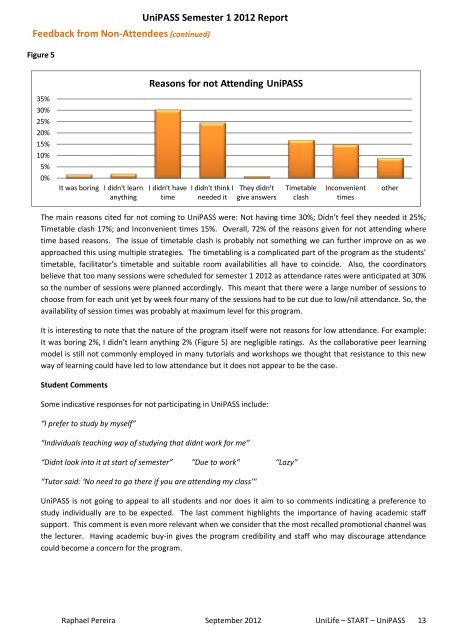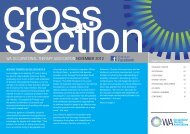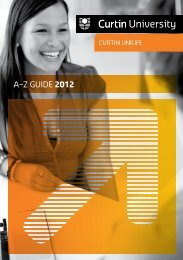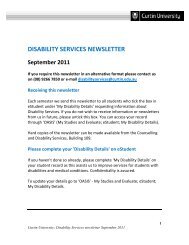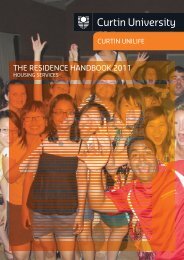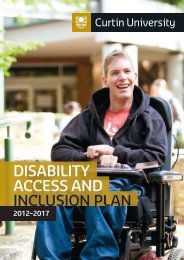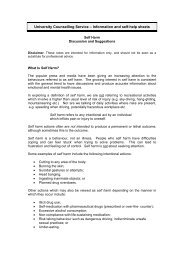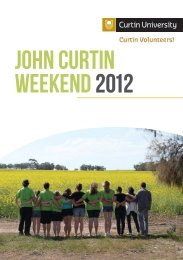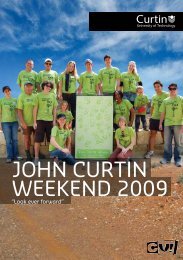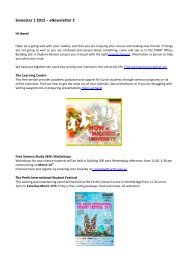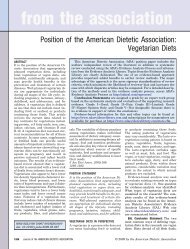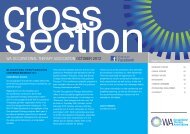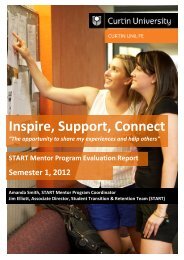UniPASS Report Semester 1 2012 - Unilife - Curtin University
UniPASS Report Semester 1 2012 - Unilife - Curtin University
UniPASS Report Semester 1 2012 - Unilife - Curtin University
You also want an ePaper? Increase the reach of your titles
YUMPU automatically turns print PDFs into web optimized ePapers that Google loves.
Feedback from Non-Attendees (continued)<br />
Figure 5<br />
<strong>UniPASS</strong> <strong>Semester</strong> 1 <strong>2012</strong> <strong>Report</strong><br />
Reasons for not Attending <strong>UniPASS</strong><br />
35%<br />
30%<br />
25%<br />
20%<br />
15%<br />
10%<br />
5%<br />
0%<br />
It was boring I didn't learn<br />
anything<br />
I didn't have<br />
time<br />
I didn't think I<br />
needed it<br />
They didn't<br />
give answers<br />
Timetable<br />
clash<br />
Inconvenient<br />
times<br />
other<br />
The main reasons cited for not coming to <strong>UniPASS</strong> were: Not having time 30%; Didn’t feel they needed it 25%;<br />
Timetable clash 17%; and Inconvenient times 15%. Overall, 72% of the reasons given for not attending where<br />
time based reasons. The issue of timetable clash is probably not something we can further improve on as we<br />
approached this using multiple strategies. The timetabling is a complicated part of the program as the students’<br />
timetable, facilitator’s timetable and suitable room availabilities all have to coincide. Also, the coordinators<br />
believe that too many sessions were scheduled for semester 1 <strong>2012</strong> as attendance rates were anticipated at 30%<br />
so the number of sessions were planned accordingly. This meant that there were a large number of sessions to<br />
choose from for each unit yet by week four many of the sessions had to be cut due to low/nil attendance. So, the<br />
availability of session times was probably at maximum level for this program.<br />
It is interesting to note that the nature of the program itself were not reasons for low attendance. For example:<br />
It was boring 2%, I didn’t learn anything 2% (Figure 5) are negligible ratings. As the collaborative peer learning<br />
model is still not commonly employed in many tutorials and workshops we thought that resistance to this new<br />
way of learning could have led to low attendance but it does not appear to be the case.<br />
Student Comments<br />
Some indicative responses for not participating in <strong>UniPASS</strong> include:<br />
“I prefer to study by myself”<br />
“Individuals teaching way of studying that didnt work for me”<br />
“Didnt look into it at start of semester” “Due to work” “Lazy”<br />
“Tutor said: ‘No need to go there if you are attending my class’"<br />
<strong>UniPASS</strong> is not going to appeal to all students and nor does it aim to so comments indicating a preference to<br />
study individually are to be expected. The last comment highlights the importance of having academic staff<br />
support. This comment is even more relevant when we consider that the most recalled promotional channel was<br />
the lecturer. Having academic buy-in gives the program credibility and staff who may discourage attendance<br />
could become a concern for the program.<br />
Raphael Pereira September <strong>2012</strong> UniLife – START – <strong>UniPASS</strong> 13


